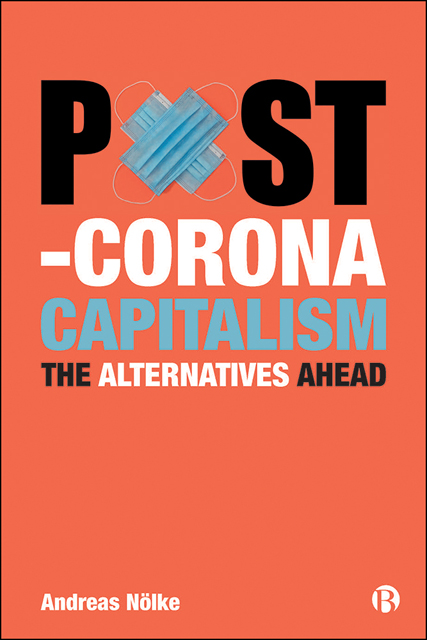Book contents
- Frontmatter
- Dedication
- Contents
- List of Abbreviations
- Acknowledgements
- Preface
- 1 Introduction: Confronting a Multidimensional Crisis of Capitalism
- Part I Capitalism and Society
- Part II Domestic Institutions of Capitalism on the Demand Side
- Part III Domestic Institutions of Capitalism on the Supply Side
- Part IV The International Institutions of Capitalism
- Part V Anthropocene Capitalism
- Part VI Geo-economic Shifts in Global Capitalism
- Part VII Ideologies in Contemporary Capitalism
- References
- Index
32 - Communitarian or Cosmopolitan Capitalism?
Published online by Cambridge University Press: 13 October 2022
- Frontmatter
- Dedication
- Contents
- List of Abbreviations
- Acknowledgements
- Preface
- 1 Introduction: Confronting a Multidimensional Crisis of Capitalism
- Part I Capitalism and Society
- Part II Domestic Institutions of Capitalism on the Demand Side
- Part III Domestic Institutions of Capitalism on the Supply Side
- Part IV The International Institutions of Capitalism
- Part V Anthropocene Capitalism
- Part VI Geo-economic Shifts in Global Capitalism
- Part VII Ideologies in Contemporary Capitalism
- References
- Index
Summary
Within days after the first victims of the coronavirus were identified, governments took decisions on a comprehensive closure of national borders and restricted flights. Particularly striking was the closure of borders within the Schengen Area of the EU, within which people were used to move freely on a daily basis for work and leisure. Accordingly, the ban on travelling freely within the Schengen Area had a radical impact not only on the EU economy but also on its identity. It was as if the pandemic pushed Europe back to its past: an area constructed of small nation states divided by real geographical borders (see Chapter 6 and Chapter 28). The ban on the freedom of movement of people within the EU was only the most extreme measure taken by governments that reminded us that the world is still made of territorial states and that the primary responsibility of governments usually is perceived to be towards the domestic population. Related measures included the ban on exports of coronavirus-related health products (see Chapter 2) or the focus on the rescue of national enterprises (see Chapter 12). We can order all of these observations by locating them in the struggle between communitarian and cosmopolitan ideologies of capitalism. Which of the two conceptions will have the upper hand in post-corona capitalism?
Communitarian and cosmopolitan models of capitalism
Like the immigration crisis in Europe and the US beforehand, the pandemic deepened the tensions between two sets of modern values. On the one side, we can find the cosmopolitan set of values, which is based on universal human rights, supranational integration and open borders. On the other side, we find the communitarian set of values, which perceives human beings as social animals and embedded in their local community, with a strong focus on the nation state as protector of the latter. In recent years, amid an acceleration of globalization, the cosmopolitan/communitarian divide cut through traditional cleavages, between conservatives and liberals on the one side and social democrats and socialists on the other. Correspondingly, the new divide transformed the ideological map in many societies.
The communitarian/cosmopolitan divide stems from Political Theory and later was applied to diverse (sub-) disciplines such as Party Politics and International Relations (Zürn and de Wilde, 2016; de Wilde et al, 2019).
- Type
- Chapter
- Information
- Post-Corona CapitalismThe Alternatives Ahead, pp. 199 - 202Publisher: Bristol University PressPrint publication year: 2022



